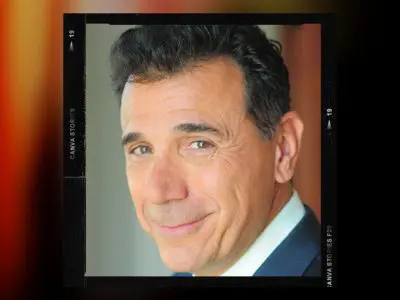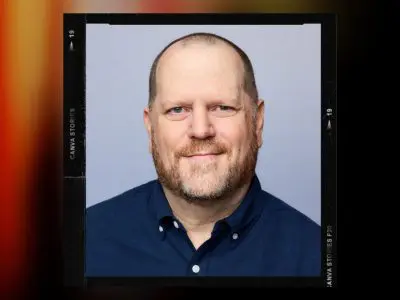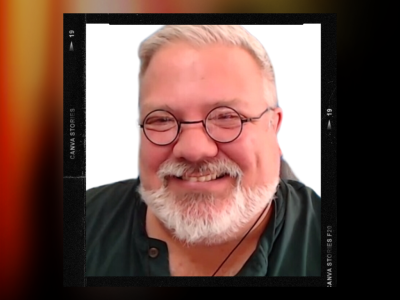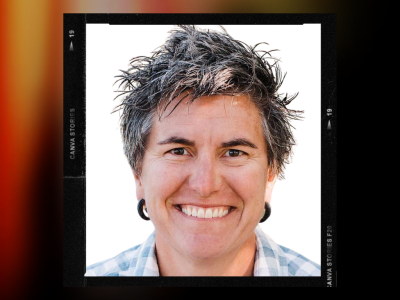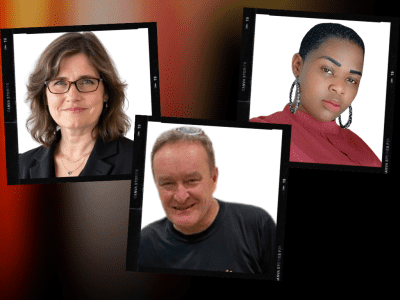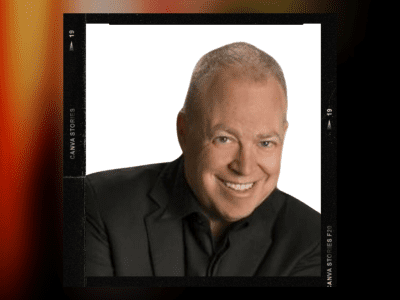The Right Seat on the Bus
w/ Wendy Hanson
Use the buttons above to listen now.
Transcript - The Right Seat on the Bus
Rich, Host: On this episode of Team Building Saves the World.
Wendy Hanson, New Level Work: And we always learn from the manager that we had. And sometimes that might not always be good. They don’t get the Sunday night. Ooh, you know, I don’t want to go to work tomorrow. Because they know they’re going to have support before you show them the big door, you know, show them the little door, and see if they can go into it.
But don’t give somebody else bad poison. Go off on your own. Yes, because you can’t be helped.
Rich, Host: Hello team! It’s me, your old friend Rich Rininsland host of Team Building Saves the World, the show where I speak to thought leaders from around the world discussing variable strategies and tools to help you and your team build a better work environment. And today we’re talking about people centered leadership with the co-founder and chief culture and community officer of new level work.
But first, I do have to share some love with my support as a team bonding. If your team is ready to experience teamwork with the power of play, then visit Teambonding.com to learn more. Now team, please join me in welcoming my guest, a business innovator, an entrepreneur, an author, executive coach, and champion for women’s economic empowerment.
Wendy Hanson. Hello, Wendy.
Thank you so much for coming on. Wendy, how are you today?
Wendy Hanson, New Level Work: That applause. I’m doing great. Thank you.
Rich, Host: That is just a small group of supporters I keep chained up under my desk. They’re here just for you.
Wendy Hanson, New Level Work: No, I’m just delighted. Thank you.
Rich, Host: Thank you. Thank you so much for coming on board. Let’s start off as I normally do.
Just introducing you to the team out there, making sure that they get a chance to know you. I understand you started out as an administrator in special education. How did you get from that to this and what led to the founding of New Level Work for you?
Wendy Hanson, New Level Work: Wow. Yes. Oh, we go back many years here. But I really always say that my, my 20 years in special ed really has helped me to be a good business person and a, uh, and a good executive coach.
Rich, Host: What’s the connection?
Wendy Hanson, New Level Work: Yeah. Well, when I was, when I, I ran programs for young people with disabilities to help them get job skills and I had to think of it in a very entrepreneurial way, which back in the day they weren’t doing. Yeah. So I did things like, well, we had students that are very, have really hard times with their manual dexterity.
So let’s find something cool and fun they can do. So I took funeral flowers and I was able to use the buses that we had, cause we had a contract as a bus company too. We picked them up at the funeral homes. They were donated by the families. We brought them, we drive them, we made potpourri, we gave packets back to the families.
And then I was able to find a wonderful, um, company, Traditions Press, who bought our potpourri and put it in their gift packages around the country. And it was like thinking differently. And that’s what I learned back then. And I started all kinds of companies, you know, a catering business. I learned that you cannot always teach a social worker to cook, but you can teach a chef how to work with students.
Yes.
Rich, Host: Nice.
Wendy Hanson, New Level Work: Nice. We had some bad food. Yes. Some things we had to learn in different ways. Yeah.
Rich, Host: Awesome.
Wendy Hanson, New Level Work: And, uh, we had big companies like 3M and Digital Equipment Corporation, which was like the biggest, um, tech company back in the day, you know, they used our services to go in and take care of their plants so that students could go in and learn job skills.
So I think if you think as an entrepreneur, which I did in education, it wasn’t a far leap. To be able to then go into being a coach. And I was very fortunate to have my first few years at Google as a coach. So I learned a lot. Wow.
Rich, Host: And now you, so you’re the co-founder of New Level Work. Do you want to actually throw some love to your other founder?
Wendy Hanson, New Level Work: Oh, yes. Yes. Stefan Peña is our CEO. Um, he’s an amazing person. He also has a Google background. He was one of the first Googlers. And then our other co-founder who we worked together for many years, Will Corley. You know, the three of us had gotten together and said, you know, managers need to have more support and love and and coaching and training and, you know, this was a problem that we were looking to solve.
And that’s when we started New Level Work, seven years ago.
Rich, Host: So what is it that actually, about New Level Work that made you guys decide this is how you want to approach the corporate world?
Wendy Hanson, New Level Work: We decided that, you know, managers, the ones that are in the middle, are the ones that don’t get enough love, you know?
If you’re a very senior level person, you know, you can get coaching and money is no object. But if you’re making all the wheels turn and you you’re reporting up, you’ve got a team you’re responsible for you need to understand how to do that and we always learn from the manager that we had and sometimes that might not always be good. So we knew that people needed to have basic skills of how to have one on ones and give feedback and then to have executive coaching so that you could really have somebody to talk to.
That was not only a coach, because all of our coaches around the world, and we’ve got them all around the world in many different languages are all certified, and they have had business experience. So it’s not just, you know, they’ve, they’ve walked the talk. Some of them have been CEOs of their own companies.
So, you know, you’re able to add value to a situation.
Rich, Host: Fabulous. So let’s get into the nitty gritty of it. We’re here to talk about people-oriented leadership. First off, what does it even mean and how do you implement it for a one on one with a manager?
Wendy Hanson, New Level Work: People oriented leadership is really that you think of.
The people are the ones that are doing the work. And as a leader, that’s your primary responsibility. You know, I’ve worked with people that I would consider spreadsheet managers, you know, that that’s how they run their business is by the spreadsheets. But when you think about people oriented, you want to keep your people top of mind, like how can I help these people? You know, how can I be empathetic? How can I create a work environment that people want to come in that they don’t get the Sunday night? Ooh, you know, I don’t want to go to work tomorrow because they know they’re going to have support. You know, they’re going to be able to you’re going to create a psychologically safe environment for people to speak up. So if you are that people oriented manager, there are so many things that you can do and you can use organizations like yours to bring teams together because teams that know each other..
Rich, Host: Right.
Wendy Hanson, New Level Work: And I’m chief of culture as you said..
Rich, Host: Yeah
Wendy Hanson, New Level Work: You know, I bring lots of people together and try to think okay. The more we get to know each other the more we support each other at work.
We do things. So people oriented leaders think about that and they think that their primary responsibility is to serve the people that are on their team and what do they need?
Rich, Host: And as I understand it, you guys do this mostly through virtual, right?
Wendy Hanson, New Level Work: Totally virtual at this point. Things might change a little in the future because as you know, we’re, we’re in a hybrid world now, but we’ve been able to do all this virtual and we just had a comment yesterday. One of our coaches was working with someone and they wrote this long testimonial about, I never thought this zoom thing was going to work, you know, to have a relationship and it does, you know, I have people that are on my team that I have never met yet, you know, coaches in different parts of the world that I feel is close to them.
I said, the only thing I haven’t done is hug you. You know, so it’s on my list of things to do, but I think being virtual, we have, we have shown, and you have shown, and that’s what I love about what you do, because you can be hybrid, you can do it in real life, or you can do it virtually, because we need to have all those going on now.
Rich, Host: But even we still have those people who are terrified of virtual. That they think it is almost the, not necessarily the cheapest way to do things, although it can be somewhat inexpensive compared to flying everybody in from, you know, across the country to be in one place at one time. But how can we teach them that they can get as much out of their personal relationships with their workers virtually as they do face to face?
Wendy Hanson, New Level Work: I think they have to have the experience because we have a lot of naysayers too. And from, for our business, the cost factor is, is totally different. If you do things virtually, you know, if you want to fly me or, any of our hundreds of coaches to the offices, right? It’s going to cost you a lot of money, you know, um, and you’re not going to be able to serve the people on your team.
So we have different levels. We have people that can do executive coaching with CEOs and everybody else. And we try to make sure that we’re creating things like using AI, that people that are not always going to have access to a coach will have some access. So,when you can do all those things virtually.
Gosh, and once we have people even through our training that get on and say, we get, because we hear a lot of this, I was a naysayer, but boy, I believe this and I’m, and I’m not going to miss, you know, like group coaching sessions where somebody facilitates and people get to know each other, you know, it’s that you can really build bonds virtually.
So I think people need to realize that.
Rich, Host: Okay. So your, so your recommendation is just try it and see if, see how you like it?
Wendy Hanson, New Level Work: Try it and see, try it and see. And, uh, yeah, I can almost guarantee that, you know, certainly doing the work with us, you’ll get, you’ll get good results and you’ll be able to do it more cost effectively and you’ll be able to bring your teams together to have conversations.
Rich, Host: What does a people oriented leader look like though? I mean, because you’re talking about a very specific set of skills, I assume. So what are those skills, and, and how do, how do I know if that’s what I am?
Wendy Hanson, New Level Work: Well, you would know if you cared about the people, and you thought about, Okay, I have these five people on my team, but I know Mary, She likes this.
You know, the best way for me to help her grow is is in this way. You know, john loves to be up in front of everybody. Um, so if I, if I’m going to recognize people, I should bring john out of town hall because he really loves that. But Mary would rather not. So, if I’m a people oriented leader, I know my people, I know what they like and I’m always looking for my responsibility as a leader and a manager is to help, is to delegate things so that my people can grow and learn.
And I can be, we have an expression, we use a lot the dance floor and the balcony because managers and leaders need to get up on the balcony so that they can see the work that’s going on. And then they bring the people up with them so that they can look. And that’s where you do your, strategic thinking and that’s where you also do your reflection time.
You go up in the balcony. Uh, we have a 360 and one of the questions is how how often do you take time to think and reflect? Which means you’re not in planning mode and um, we we often get never as an answer. So I know this person needs to spend a little time and I want it on your calendar that you’re going to be there. Just you know, how am I doing?
How’s the team? What else might I need to do and take some reflection time because we’re too much. Go, go, go, go, go, and do the next task. So a people oriented leader cares deeply about the people. They’re empathetic. They look on how to see people grow, and they reinforce. They’re really good at giving feedback.
That’s very specific. You know, “I loved it Rich, when you brought that up to the team and you were able to be very clear on what we needed to do.” Gosh, that helped us move ahead. It’s so much better than “good job, Rich”
Rich, Host: To just keep the metaphor going, can the leaders never get down to dance with them?
Wendy Hanson, New Level Work: Oh, yes.
Oh, they can get down to dance. Absolutely. They have to go down there and dance around. You know-
Rich, Host: Is that something specifically for like something like my company, or is that, is that something they can do on their every day?
Wendy Hanson, New Level Work: Every day they, they need to get down because if a leader doesn’t know the challenges that people are facing, so they don’t get down and do the work.
Like, let me try this too. Like, why are we all having a problem with this? I better go down and try this. And then take a few people and go back up to the balcony and say, what did we learn? How can we make this a little different next time? So, it’s, so we’re more successful.
Rich, Host: Okay. So we’re talking about, they have to, they have to be very good at one on one.
I’m assuming from what you’re talking about, there’s like, gotta be some great positivity. With this kind of leader. Uh, what else? What else can we, what else can we look for? Let’s put it this way, let us say that I am a new employee coming in. What can I look to find if the people that I’m working with have people oriented leadership?
Wendy Hanson, New Level Work: Great.
That somebody takes time to know who I am and know my strength. Because a people oriented leader helps people use their strengths because if you give me a job that I am not strong at, at all. You know if you put me in financial services and you think I’m going to do a good job, you’re going to be wrong. You know, if you put me in something that’s related to people, I’m going to do much better. And so to look at the strengths of your people we do StrengthsFinder, really get to know who somebody is so that I can put them in the right seat on the bus.
You know, everybody’s gonna be on the bus, but you can be on the bus and be in the wrong seat. So a people oriented leader knows that and a people oriented leader brings out the best in the people that they work for.
Rich, Host: You mentioned strength finders. What is that and how are they implemented?
Wendy Hanson, New Level Work: Um, Gallup has a assessment called strength finders and it’s a pretty easy assessment to take.
Um, so we actually do it. We have one company that does executive coaching with us that now has added strength finders into everything so that they want people to know their strengths so that teams can talk to each other and say, you know, Oh, You’re really good at this. I can see from your strengths.
You’ve got more of those Strategies strengths, you know, and I have more of the people strengths. Let’s see if we can work together on this. So when we know how to do that, we do classes on that all the time because we really see how It’s positive. It’s like not showing all what your weaknesses are, but it’s showing what your strengths are, and people are usually afraid of assessments because they’re going to say, Oh, I’m going to say I’m not doing this very well.
But in a strength assessment, it’s like these are the things that I’m good at. And let’s give me an opportunity to do more of that.
Rich, Host: What about those people who were who are, let’s face it, the biggest opposition so many people have nowadays is just fear? They, they’re terrified of not looking like the success they’re trying to pervade or to, to show, whether that’s the management or even the employee, how do we get past it so we can, as a leader, how would I get past it?
Not only myself, but for my employees to let them know, you don’t need to be afraid to show me who you actually are.
Wendy Hanson, New Level Work: Yeah, we have to try things. We have to be able to take risks. And as a leader, you need to support that. And, and then not throw somebody under the bus if something goes wrong, you know, so we want to be able to support those things and give people opportunities to flourish.
And we have a lot of people these days that we coach that really lack confidence. And it’s an old story in their head. And so you have to bring up the things like, think about a time when you did this really well. Well, let’s now move this to something else. Now try that same strategy there, you know, and I often think, what would I do if I were brave?
And I just had this conversation with somebody. What would I do if I were brave? But she said, yeah, I guess I really don’t have anything to lose if I, you know, I got back at my boss right away when we had a meeting together and he was really, he thanked me. And usually I don’t follow up because I’m a little afraid what he’s going to say.
It was like, what do you have to lose? So I think people need to realize that, that they’re in an environment that’s safe, but the leader creates that environment. A people centered leader creates that so we can all do our best work.
Rich, Host: Is it just by example or?
Wendy Hanson, New Level Work: Example, it’s by how they work with the team.
It’s by modeling how you do the recognition. It’s bringing your team together and having everybody. Take turns leading, you know, like let’s, let’s do a team meeting, you know, Harry, I think, you know, why don’t you lead us off on this one? Or let’s take 15 minutes in the beginning of the meeting to get to know each other.
Why don’t you set up this? Because then it empowers people. Because what we want is for people to keep growing and keep learning. And if you’re a good people centered leader, that’s going to be your priority.
Rich, Host: Fabulous.
Wendy Hanson, New Level Work: Because that will then create the productivity that creates the business results. Plus, so that’s kind of a given..
Rich, Host: Plus you’re training your next generation of leaders- All right.
Wendy Hanson, New Level Work: We have lots of generations.
Rich, Host: Indeed. And I want to dig even further into this, but I do need to step aside, Wendy. Hope you don’t mind, because I need to tell my friends out there about a company I am very proud to be a part of. TeamBonding. TeamBonding was founded over 20 years ago with one simple question.
How can employees have a great time while fostering strong, authentic bonds between people who work together? No matter where your company is located, Team Bonding offers powerful, engaging, custom built team building events designed to get the best out of your team anywhere in the world. They’ve created a catalog of innovative events using the power of play as a learning tool and tapping into the correlation of work and play.
So whether it’s scavenger hunts or jeopardy and so much more, the team bonding of activities, whether it’s live, virtual or hybrid, maximizes the impact of team building with an accent on fun. So visit TeamBonding.com to schedule your event. TeamBonding, when you want seriously fun results.
And speaking of seriously fun, I’m back with a seriously fun friend of mine, Wendy Hanson.We are talking about people oriented leadership. Wendy, everything sounds very easy, especially if you have those people who are specifically built for that kind of, that kind of mode of thinking. What about the people who aren’t? What about those who are resistant? What about those for whom the spreadsheet is the end all be all of their existence as a manager?
Or the bottom line, the last penny, all of that. How do we convince them that they need to change the page?
Wendy Hanson, New Level Work: That’s challenging sometimes. And, and the, the, what we’ve had in the past is that people thought they could not rise in a company unless they became a manager.
Rich, Host: Right.
Wendy Hanson, New Level Work: You know, and what we find now, and this is taken from, “Help Them Grow or Watch Them Go,” by Julie Giulioni, who, she says, it’s not a ladder anymore.
It’s a climbing wall. And so we have to keep learning new things and doing different things. So you, you really need, you don’t, if you’re a, if you’re a manager and you don’t want like people and you don’t want to help people grow, you should not be in that job, you know? And, uh, there will be people on your team who will really just like, just let me do my work.
That’s okay. You create a space for that. But if your job is to help people grow, manage people, you know, manage them so that they could actually be your successor. You know, you’re trying to build something that people will be able to grow in this company. And we know there’s a lot of different generations now in companies.
So as a leader, you’ve really gotta be aware that, you know, when you have a, uh, somebody that’s in their 20s and they’re coming in Gen X, Gen Z. They’re all going to be different. They’re going to look at things differently. If you were raised only on social media and you’ve never known life without technology or a screen, you’re going to look at life a little differently, but you want to take advantage of their talents.
Because they’re going to think about things differently, maybe than a baby boomer thinks about things differently, who’s going to use from their experience. So as a manager and leader, you have to take all those pieces and use them together to help people, you know, this is a good place to work. I like this, you know, I can do my best work here.
Rich, Host: And people who feel that way, stay. And that’s going to save the company thousands of dollars per person.
Wendy Hanson, New Level Work: Yeah. It’s a great retention strategy, you know? And so you need to pay attention to it because it is such a costly problem if people leave. Right. And you know, we know that the old saying is people leave managers, not companies.
Um, and so, you know, and also Gallup has done a lot of research. And one of the things, if you have a best friend at work and people used to ask, why did they ask that question? But if you have people that you work with, that you care about, that you’ve developed relationships, you’re, you’re less likely to leave.
Cause you could be, I could end up with a worse manager and I won’t have my colleagues and blah, blah, blah. So that’s, that’s truly important to be able to take that into consideration because the retention piece and even to be able to provide people with professional development, that if you have a manager who’s pushing that more people are asking that, and they’re asking now about culture and companies, you know, when they are applying for a job, well, tell me about the culture in this company and they’re going to assess the culture through their process of even interviewing to see, you know, did they walk the talk that they’re talking about, that they have a good culture there, but people want to join companies that have a great culture and the people oriented managers, that’s important to them.
Rich, Host: What kind of questions. Can we expect to find for people who are looking for that kind of company culture?
Wendy Hanson, New Level Work: Well, they’ll ask blatantly because I’ve heard this from our recruiting staff that interview people like, Tell me about the culture in this company. You know, what does it look like? So you have to say what’s going to happen. Like in our company, we have a culture committee. And, uh, until we do different activities, we had a happy hour last night that people came on from all over and it was just fun.
It was like 35 minutes. And I learned things about people. I had no idea because we’re usually so task oriented-
Rich, Host: right?
Wendy Hanson, New Level Work: So, you know, they will ask what goes on, you know, how do you build that culture? You know, what does it look like? You know, what’s people’s, you know, what do people think about it? And they need to have an opportunity to talk to different people, to see, is what they’re saying true?
You know, they have to have different interviews so that they can check out. Does this person seem like they’re walking the talk of the culture? Because that is how we’re going to retain people, keep them going. Is a good culture, good support, good professional development, good team bonding,
Rich, Host: Right, Right
Wendy Hanson, New Level Work: People get together, and then they will be productive and the company will be productive and all is well.
Rich, Host: So while we wish that was the case all the way throughout people’s careers. What kind of challenges can this type of management face? What are, what are out there right now? What have you personally seen where this kind of manager, you met them, you know, pretty much right off the bat, this is exactly the kind of thing. You are the exactly the kind of manager who can make this a success, but what challenges are they facing?
Wendy Hanson, New Level Work: They face the challenges of somebody on there who says, I’m just here to do the work, you know, I just, and they’re, and they’re not going to take feedback and they’re not going to want any feedback, you know, and have somebody on the team that just, does not, does not want to collaborate with other people, wants to do their own thing. And, and really none of us should be in a silo because siloed organizations are not successful, right?
Rich, Host: Yeah.
Wendy Hanson, New Level Work: So you need to have somebody that wants to collaborate and do different things together. And when you have that kind of person, you need to, sometimes they, they can be a poison and you got to be careful because if somebody like that really becomes a poison, you need to have them go. And one of the things I think is important for people to really pay attention to when you bring somebody on and you think they were a good match on your team. You know, the first 90 days pay very close attention because after that you kind of own them and it’s harder to have them leave.
But make sure that it’s a good fit because if it’s not a good fit, you know, it’s time to say goodbye before they bring the rest of the team down. So, a good people manager needs to know how to be strong. At saying, no, this is not a good fit, you know?
Rich, Host: What kind of evidence can I expect to see when that type of person is bringing the rest of the crew down?
Because maybe you have that person who is showing me everything I want to see. But when I’m looking somewhere else, they’re just dragging the rest of the crew by the wayside.
Wendy Hanson, New Level Work: You’ll see the productivity of the rest of the team go down, you know, and some people sometimes they won’t talk about it because they won’t want to say something, but then things will kind of sneak out, you know, like, I wasn’t able to complete this task because, you know, John wasn’t able to do his part, you know, and so slowly it will come out and, uh, and you’ll, you’ll see it.
If you bring a group together, you’ll be able to see the interactions with the group and how they ask. And so you really have to keep going up to that person as the leader and say, you know, what I’m noticing is this, you know, how do I support you at doing more of this? And then know. That you can give them the constructive feedback to say.
You know, when you do this, it really has such a negative impact on this group. What are we going to do to help you to move things along better? You know, I want to be your support, but you have to be playing with me here. So a good leader knows how to give very positive reinforcement, and they also know how to give constructive feedback so that people in the sake of, we want people to change and grow.
Rich, Host: What are some of the skills that we need to do that though? Because if there is that person, you sort of have to drag along kicking and screaming. I mean, how, how can we do that while keeping the rest of the team afloat? Because it sounds like that person’s just going to take a lot of energy for a people oriented manager.
Wendy Hanson, New Level Work: And it may not, they may not be the right fit. There may have been a life experience that happened that they’re not the right fit. I think you got to be able to know when to cut your losses and give them a chance. Know, you know, know that you’ve supported them and then say, no, this is just not going to work because it’s bringing the rest of the company down.
So I think keeping people in that are a bit of a cancer to a team or an organization is not good at all. You know, you gotta, you gotta really, but you have to know you did your work. You gave the support you needed. And then you can, you know, there may be a better fit somewhere else in organization that, that they could work at.
Rich, Host: And is it possible that there might be somewhere else in your own company that they might be a better fit that maybe they, maybe they will be soloing more often in this position than other places. Right.
Wendy Hanson, New Level Work: Yeah, um, there was, there was a story I heard from one of our coaches recently about that, that somebody, they weren’t making it on this team, but they went on another team, and they actually flourished, because it was a little different situation, and, uh, maybe they didn’t need to be as creative or they, they, they were, it was really wrote on this other team. They could just follow the, follow the instructions and they were doing that. Well, and they were successful there. So yeah, that’s a great way to see before, before you show them the big door, you know, show them the little door and see if they can go into it, but don’t give somebody else bad poison, you know, make sure that whoever is going to go, you tell them the truth, here’s the challenges I have.
And that’s where the climbing wall aspect of career development, like they could intern in another group for a while and see how that works, you know, you never know somebody until you live with them. So give them a chance to do that before they adopt them.
Rich, Host: Do you ever see managers who think that this is the kind of methodology they’re using, but are actually, I don’t want to say being their own poison, but bringing that kind of negativity to the group while trying to be positive.
Wendy Hanson, New Level Work: Yeah. Yeah, I do see that. And, uh, we see it in ways of people not realizing what they’re saying. Like somebody, somebody said the other day about being a, Well, I’m a little bit of a perfectionist. And then they’re like, I really liked how this person did it because they did it my way. And it’s like, Oh, you know, if we all have a goal and we know what the goal is, I might get there in a little different way.
And that’s okay. You know? So I think people that do that, that kind of get stuck on this has to be my way, or it’s not going to work, you know, and I want you to follow it exactly the way I do it. You’re not leaving it open for people to use their own creativity and maybe come up with even a better idea.
Rich, Host: I hate to say it, but I think I married that person.
Wendy Hanson, New Level Work: Whoops.
Rich, Host: What about from on high? What kind of, what kind of difficulties can your manager face from those up above, like, cause you said, this isn’t really like a C suite thing. So what can they, what kind of conflict can they expect to see from on high?
Wendy Hanson, New Level Work: Well, sometimes on high, if they’re too on high, they don’t know what’s going on on the ground. And so they might see some decisions being made that they don’t really understand, you know, and so they have to have faith in their people, that their people skills are good. Because sometimes in the C suite, you have all kinds of different strengths because you need different strengths.
You know, you have the people that have clear operational strengths, those that are strategic, those that are really looking, you know, only we’ve got to build this technology, we have to build this product. So we have to make sure that we’re looking at all sides and that when you’re a manager and leadership, we always know that, um, organization is often a mirror of what the leadership is.
So that’s, that’s an important piece to think about, you know? So how our leaders show up is how everybody is going to judge a company. So leaders need to make sure that they’re walking the talk. And then they need to, managers need to know that they’re able to be in a psychologically safe environment. So if they’re not walking the talk, they can say something.
Rich, Host: Right.
Wendy Hanson, New Level Work: Because we’re all in this for the same end, which is making the company succeed. And whatever that, whatever that takes, but not whatever that takes. Right. That somebody’s gonna get hurt, but whatever it takes. It’s a different way.
Rich, Host: And if you don’t feel safe as a manager, you’re not going to be able to make your employees feel safe.
Wendy Hanson, New Level Work: You’re not going to take risks and you’re just going to do the status quo and the company won’t grow.
Rich, Host: How teachable is all of this really, Wendy? I mean, let’s, the bottom line of it is there some way out there that one of my listeners can, can actually go, I want to see if this is me before I put these practices into effect.
How good can I actually be at this?
Wendy Hanson, New Level Work: I think there are ways that, that people can learn these skills. Sometimes people have been managers for many years. I’ve worked with people that are very senior level. They’re like, I’ve never been able to give, they don’t even call it constructive feedback. They, you know, I haven’t been able to tell people they don’t do things right.
You know? And so if they learn and we use something a difficult conversation planner to help people think through things so that that’s a really important piece so that you know you can get the skills because sometimes people think they’re good listeners like one of the biggest things that are important in a manager a leader, is to be a good listener.
And we learned that in coaching. We learned that, you know, if you’re listening, what we call it, level one, where you’re just thinking about your next question, you know, I’m not going to feel listened to, but if you really sit back with a empty head and you listen, that person is going to feel heard. So as managers and leaders, everybody needs to be good.
Listeners have good coaching skills and you can learn those and you can practice those. So there’s, you know, nobody’s too far gone unless you don’t want it. If you don’t want to learn, if you do not want to be a good leader. Then nobody can help you, you know, you might as well, yeah, go off on your own. Yes, because you can’t be helped.
Rich, Host: Is there a book or is there a website or anything that you know of or even have yourself that you can point these people in that direction?
Wendy Hanson, New Level Work: New Level Work happens to be a place where you can do that. So, Go on to NewLevelWork.com and you’ll be able to see things. You’ll be able to see what are the things that managers and leaders need to know.
And, and there’s some tools that are going up on there too, that you’ll be able to do a, you know, ask questions to a leadership oracle that we’ve developed of what do I do in the case of this? And and what it is, is accumulated knowledge using AI from all of our coaching and everything that we’ve done, so there are tools up there that you can do that with so it really you can see what what is going to make a good leader and you’re going to be able to see What are some things that you could do to grow your team and grow your company?
So NewLevelWork.com, great place to go hang out for a little while. … you can always call me.
Rich, Host: Fabulous. Is this something that those middle managers can just do on their own or is this, they need permission or, or is it just not cost effective unless the company is taking care of it themselves?
Wendy Hanson, New Level Work: People that actually pay privately, you know, um, that it’s really important to them. Often it’s after they have had. And experience that their company has paid for. And they say, this is so good. I want to pay privately, you know, but usually we work with HR and L and D leaders because we’re partners with them.
We want to help to make the company stronger and make their job easier too, you know, because. They can’t teach everything. So, you know, we can be a partner with those people. And I think that’s really important. So a lot of people that go to that, you know, our NewLevelWork.com are, you know, HR people and, and, uh, but any managers could go and say, I saw this thing, or I heard this podcast with this wonderful guy, Rich.
He was talking to Wendy. And I think maybe we should look into this, you know, that wouldn’t be a bad thing.
Rich, Host: Fabulous. Do you have any wishes for those people out there? Any recommendations or any, any little nuggets of hope that you can give to those people oriented managers out there who just feel lost in the weeds or, you know, un, un-listened to themselves.
Wendy Hanson, New Level Work: Get into a group with other people that also think positively. Set up your own executive team for yourself, that, that you can check in with people, people that are going to be supporting you. Don’t try to do it all alone, but if you can get in a group and be part of, uh, another, like, support organization or, or the ERGs and companies to be able to have conversations with people, do that.
Because. None of us can do everything by ourselves. And the more that we can learn from other people and the more that you can say, you know, here’s, I’m having a challenge with this and talk to some, you know, some others that are having that. We have a partner council at our company, which some of our top HR and L and D leaders are part of to share ideas and share, have you had this problem?
You know, how did you solve it? So I think that’s how we’re all going to grow and learn if we work together for everybody’s benefit.
Rich, Host: So always remember my team, no matter how alone you feel, you’re never that alone.
Wendy Hanson, New Level Work: You are never that alone.
Rich, Host: Love it. Love it. Folks, please. My team give a big round of applause to Wendy Hanson.
Wendy, thank you so much for coming on. This was a fantastic conversation. I hope you had as much fun being here as I did.
Wendy Hanson, New Level Work: I did. I did. Rich. Yes.
Rich, Host: Excellent. Excellent. And I hope that continues to be the fact because Wendy. It’s time for my speed round.
Just so there’s anybody out there who doesn’t know what this is yet. My speed round is very simple. I’m going to ask Wendy a series of questions over 60 seconds. They are simple, innocuous questions. Just a way for us to get to personally know you a little bit better. If you’re feeling at all competitive, that, uh, that 60 seconds where we’ve reached about, I think the largest and fifth season has been 13 questions.
So we can try together to see if we can get us past that. Do you feel, you feel lucky?
Wendy Hanson, New Level Work: I feel lucky. Yes. All right. When I feel like I know myself enough, I hope. Yes.
Rich, Host: Fabulous because that’s all this is about. So I’m going to start the questions. When you hear some music. And let’s have some fun.
What’s your name?
Wendy Hanson, New Level Work: Wendy Hanson
Rich, Host: How many kids you have?
Wendy Hanson, New Level Work: Zero
Rich, Host: Which one’s your favorite?
Wendy Hanson, New Level Work: I have nieces. They’re my favorite.
Rich, Host: Nice. Uh, do you have any pets?
Wendy Hanson, New Level Work: No
Rich, Host: What is your favorite holiday?
Wendy Hanson, New Level Work: Oh, I love Christmas.
Rich, Host: Would you rather look
Wendy Hanson, New Level Work: around? And they do cool things at Christmas. Nice.
Rich, Host: Would you rather live for a week in the past? With the future.
Wendy Hanson, New Level Work: The future
Rich, Host: Okay. What is your favorite ice cream flavor?
Wendy Hanson, New Level Work: Chip, chocolate chip.
Rich, Host: What is your most embarrassing childhood memory?
Wendy Hanson, New Level Work: Ooh, wetting my pants in the playground.
Rich, Host: Okay. If you could eat any food for the rest of your life, what would it be?
Wendy Hanson, New Level Work: Oh, it would be hummus.
Rich, Host: What’s one choice that you really regret?
Wendy Hanson, New Level Work: Um, doing things, not staying on the hang gliding hill long enough to learn how to hang glide.
Rich, Host: Fantastic. Wendy 14, you hit 14.
Very nice. Well done. Wendy again. Thank you so much. Um, is there any way that anybody, cause I know you’ve written some books. Or is there anything you want to promote for yourself before we say our farewells for today?
Wendy Hanson, New Level Work: From kind of a former life, you know, the Sassy Ladies Toolkit for Startup Businesses, which really, you know, the messages are still good because I believe everybody in companies need to be intrapreneurs.
You know, we can learn so much from entrepreneurs, but you can be an intrapreneur in your company. So there’s no books. I would just say, go to NewLevelWork.com and see what’s there. And check me out on LinkedIn and say, hello. I love to have conversations with people. And, uh, I always think that you never know, you know, there are things that we can support each other with.
So just reach out Wendy Hanson. I’m right on LinkedIn.
Rich, Host: Wendy. Thank you so much. I don’t want this to end. We’re having so much fun.
Wendy Hanson, New Level Work: This has been a pleasure. Thank you, Rich. And I would love to have you on my podcast. I have a podcast building better managers and I am going to reach out because we’re going to continue this fun.
Rich, Host: Love it. Anytime, day or night, let me know. And thank you, my team out there. That’s it. We’re wrapping up yet another episode of Team Building Saves the World. If you are an old friend of the show or a brand new listener to the podcast, please be sure to share this with everyone that you know, whether they’re a coworker or a friend, a family member, it helps us really to share this vital information.
You can find out all about us, including all past episodes, TeamBonding.com/Podcast, you can also find us wherever you find your favorite podcast, Google podcasts, Apple podcasts, Spotify, wherever you go to listen, my friends, we will be there. And don’t forget to look for us on all the social medias at Team Bond podcast.
Leave me a message there. Tell me what you liked about the show, what you didn’t like about the show. If you have an idea for future topics, this is how you become a more valuable member of my team. We want to hear from you. So my friends, before we say our farewells for this episode of Team Building Saves the world, please never.
You’re within the sound of my voice. You’re on my team now. And I am forever gonna be on yours. So long, team. I’ll see you next time.
AD:
It’s been said that you learn more about a person in an hour of play than in a year of conversation. So why not put your co-workers to play with the help of the team at Team Bonding. TeamBonding was founded over 20 years ago with one simple question. How can employees have a great time while family authentic bonds between people who work together.
Their catalog of innovative events includes scavenger hunts, Jeopardy, and much more. Each activity, whether live, virtual, or hybrid, maximizes the impact of team building with an accent on fun. Visit TeamBonding.com to schedule your event now. Team bonding, when you want seriously fun results.
April 15, 2024
Join host Rich as he engages in a dynamic conversation with Wendy Hanson from New Level Work on the essence of people-oriented leadership. In this insightful episode, Wendy delves into the core principles of effective leadership, emphasizing the significance of understanding and supporting team members to foster growth and productivity. From recognizing individual strengths to providing constructive feedback, Wendy shares valuable insights into creating a nurturing work environment where everyone can thrive. The discussion explores challenges faced by managers, including dealing with negative employees and maintaining a positive company culture. With practical advice and real-world examples, this podcast offers a compelling narrative on the importance of continuous learning, collaboration, and support in leadership roles. Tune in to discover actionable strategies for empowering leadership and building stronger, more resilient teams.
About Wendy Hanson:

" We have to try things. We have to be able to take risks. And as a leader, you need to support that. And, and then not throw somebody under the bus if something goes wrong, you know, so we want to be able to support those things and give people opportunities to flourish."- Wendy Hanson
Get more human resources and leadership advice.
Less drama? Greater teamwork and job satisfaction? TeamBonding is here to help you build a stronger and happier team. Subscribe to get our team building podcast and thought leadership blogs sent straight to your inbox.







